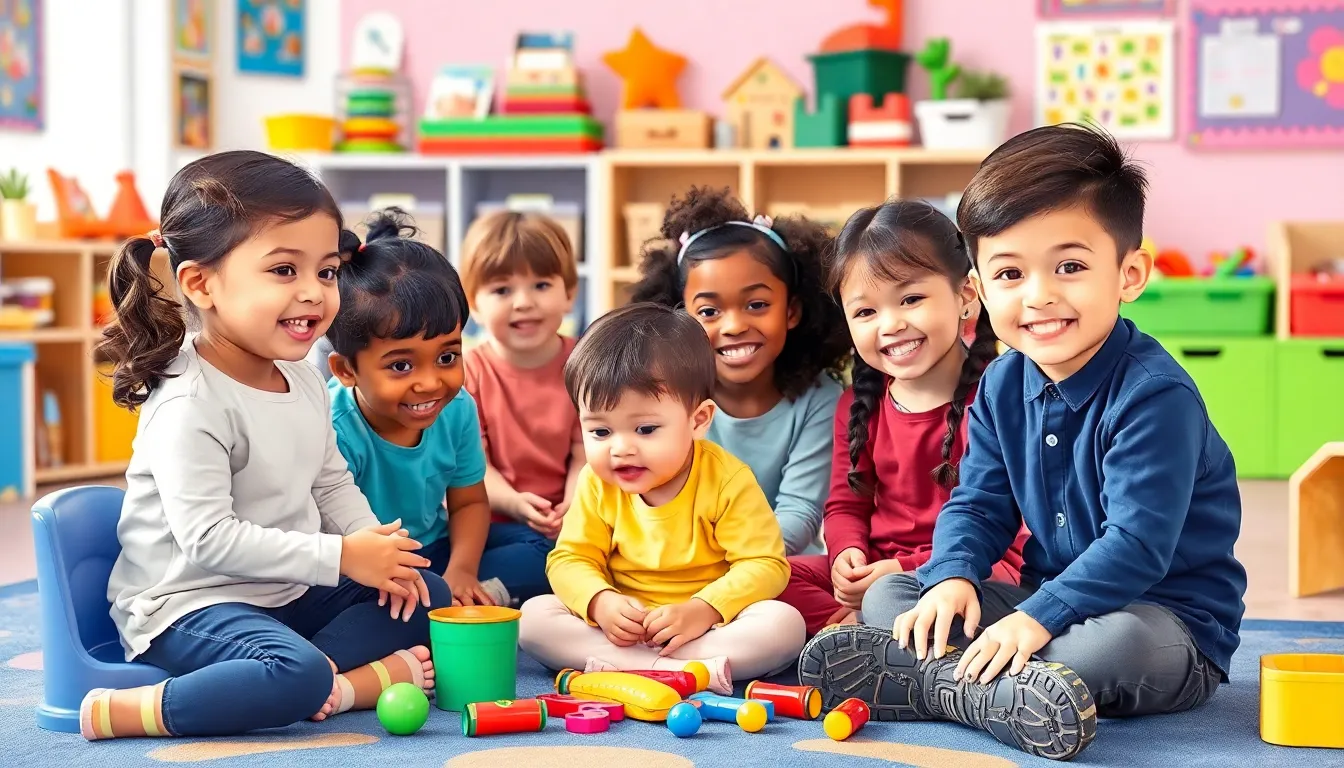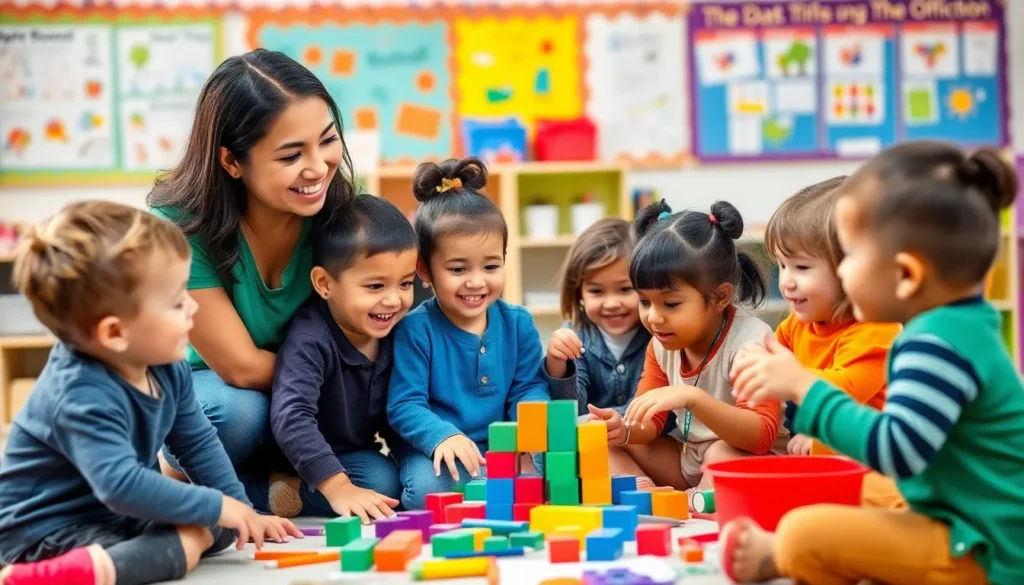Table of Contents
ToggleEarly childhood education isn’t just about crayons and nap time; it’s the secret sauce for shaping bright futures. Imagine a world where kids learn to read before they can tie their shoes—sounds like a superpower, right? Well, that’s the magic of early education. It lays the foundation for lifelong learning, social skills, and even emotional intelligence.
Understanding Early Childhood Education
Early childhood education plays a vital role in developmental stages. It encompasses various educational programs geared toward children from birth to eight years old.
Definition and Importance
Early childhood education refers to organized instructional programs and environments specifically for young children. This education focuses on fostering social, emotional, cognitive, and physical development. It’s critical because research shows that high-quality early education leads to improved academic performance and better life outcomes. Engaging activities allow children to develop essential skills such as literacy, numeracy, and emotional regulation. All children benefit from these foundational experiences, as supportive environments encourage curiosity and exploration.
Historical Context
Historically, early childhood education evolved significantly over time. In the 19th century, reformers recognized the importance of structured learning for young children. They advocated for early education as a means to prepare children for future academic success. Formal programs began to take shape with the establishment of kindergartens in the late 1800s. Prominent figures, such as Friedrich Froebel, played essential roles in promoting child-centered learning approaches. Over the decades, various educational philosophies emerged, further shaping the landscape of early childhood education. Societal shifts continued to emphasize the value of investing in children’s early years, reinforcing its importance in contemporary education systems.
The Benefits of Early Childhood Education

Early childhood education offers numerous advantages, shaping children’s futures and enhancing their development. It focuses on critical areas such as cognitive growth and social-emotional skills.
Cognitive Development
Cognitive development plays a vital role during early years. Engaging educational activities stimulate brain growth, fostering skills like problem-solving and critical thinking. Children exposed to high-quality early education often demonstrate advanced literacy and numeracy skills. For instance, research indicates that children enrolled in structured programs score higher on standardized tests compared to peers without such experiences. Moreover, early education environments encourage curiosity and exploration, laying a strong foundation for lifelong learning.
Social and Emotional Growth
Social and emotional growth gains momentum in early childhood education settings. Children learn to interact with peers, fostering important skills like empathy and cooperation. Structured activities promote sharing, conflict resolution, and teamwork, which are critical for future relationships. Programs that emphasize emotional regulation help children manage their feelings effectively, reducing behavioral issues. Statistics show that children who participate in early education exhibit higher social competencies throughout their lives. These skills contribute to healthier relationships and improved academic success as they progress through school.
Different Approaches to Early Childhood Education
Various methodologies exist within early childhood education, each emphasizing distinct principles and practices.
Montessori Method
The Montessori method promotes independence and self-directed learning. Children choose activities that interest them within a prepared environment, allowing them to explore at their own pace. Multi-age classrooms facilitate peer learning, enhancing social skills and cooperation. This approach emphasizes practical life skills, enabling children to develop a sense of responsibility. Research suggests children engaged in Montessori programs exhibit higher academic performance and improved problem-solving skills.
Reggio Emilia Approach
The Reggio Emilia approach values collaboration and expressive arts. Children engage in project-based learning, exploring topics that spark their curiosity. Teachers act as guides, facilitating discussions, and providing resources. Documentation of children’s work allows for reflection and deeper understanding. This method encourages parental involvement, fostering a community around the child’s education. Studies show this approach leads to significantly heightened emotional intelligence and social abilities.
HighScope Curriculum
The HighScope curriculum focuses on active participatory learning. Children engage in hands-on experiences, promoting critical thinking and decision-making. A clearly defined daily routine helps create a stable learning environment. Teachers plan activities based on children’s interests, supporting individual learning styles. This curriculum also prioritizes assessment through observation, allowing teachers to track developmental progress effectively. Evidence suggests children in HighScope programs achieve better outcomes in literacy and mathematics.
Challenges in Early Childhood Education
Early childhood education faces several significant challenges that affect its effectiveness and reach.
Funding and Accessibility
Funding plays a crucial role in the availability of high-quality early education programs. Many regions experience budget constraints that limit resources for early childhood initiatives. Publicly funded preschool options are often limited, creating barriers for low-income families seeking access. Research indicates that increased investments in early education lead to better outcomes, yet disparities persist across different communities. Affordable tuition and financial aid programs could improve accessibility for families in need. Policies addressing these challenges need to prioritize equitable funding to ensure all children benefit from early education experiences.
Teacher Training and Retention
Teacher training poses another significant challenge in early childhood education. Many educators pursue certification programs that do not adequately prepare them for classroom dynamics. Professional development opportunities often lack consistency, hindering the growth of teaching skills and knowledge. High turnover rates create instability in classrooms, impacting children’s learning experiences. It’s vital to provide ongoing support to teachers, enabling them to build strong relationships with their students. Research shows that when educators receive adequate training and support, children exhibit improved academic performance and emotional development. Effective strategies, including mentorship programs and competitive salaries, can foster greater teacher retention.
Investing in early childhood education is vital for nurturing well-rounded individuals. The benefits extend far beyond the classroom, influencing academic success and social skills that last a lifetime. By understanding the historical context and diverse methodologies, stakeholders can make informed decisions that enhance early learning experiences.
Addressing challenges like funding and teacher training is essential to ensure that all children have access to high-quality programs. As society continues to recognize the importance of these formative years, collective efforts can pave the way for a brighter future for every child. Prioritizing early childhood education is not just an investment in individuals but in the community as a whole.







